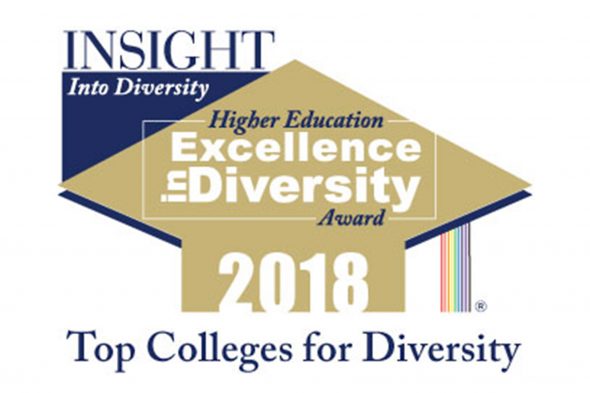UIC lauded with national award for diversity, inclusion
The University of Illinois at Chicago has received the 2018 Higher Education Excellence in Diversity (HEED) Award from INSIGHT Into Diversity magazine.
The magazine, the oldest and largest diversity-focused publication in higher education, recognizes U.S. colleges and universities that illustrate an outstanding commitment to diversity and inclusion.
UIC will be featured in the November issue of the magazine along with the 95 other recipients of the 2018 HEED Award. This is the third time UIC has earned this prestigious award.
The university received the award because of its commitment and leadership in regard to diversity on campus, where 60 percent of its students are eligible to receive federal Pell Grants, said Amalia Pallares, associate chancellor and vice provost for diversity at UIC.
UIC is one of the very few Research 1 minority-serving institutions, she said. The university is an Asian American and Native American Pacific Islander-Serving Institution, or AANAPISI, and it has received designation as a Hispanic-Serving Institution, or HSI, by the U.S. Department of Education.
“Underrepresented students attend UIC at all levels — undergraduate, graduate, and professional — and they have many opportunities to do engaged research in Chicago alongside UIC faculty,” Pallares said.
“UIC thrives upon the increasing diversity of its urban campus community, and relies on its diversity to create shared knowledge, new opportunities and intercultural understanding that prepares everyone — students, faculty, staff, and the Chicago community — for wider and deeper engagement with our increasingly global society.”
Among recent examples of initiatives undertaken to improve diversity and inclusion, UIC officials point to the creation of the Arab American Cultural Center in 2017; the new Disability Cultural Center created this year; and the Department of Education sponsored L@s Ganas (Latin@s Gaining Access to Networks for the Advancement of Science).
The Centers for Cultural Understanding and Social Change are seven units at UIC that recognize broad communities of culture, background and awareness. These centers focus on African American, Arab American, Asian American, Disability, Gender and Sexuality, Latino, and Women’s Leadership issues. While each center sponsors events and programming to engage the campus community, they often work with each other to highlight key intersectionalities and promote cultural understanding.
UIC’s Arab American Cultural Center — the first cultural center to serve Arab students on a U.S. college campus — opened its doors in 2017. It came about after UIC administration, at the urging of students, determined a need for Arab and Muslim students to have a safe space for building community, increasing awareness about Arab American cultures at UIC, and promoting social justice, equality and inclusiveness on campus.
The university created the Disability Cultural Center in February to respond to students who were seeking out cultural and educational programming that is distinct from the services offered by the UIC Disability Resource Center, which focuses on providing accommodations to students, faculty and staff with disabilities. The Disability Cultural Center aims to foster spaces for intentional, open and respectful dialogue while furthering critical understandings of disability, and to promote campus understanding and knowledge of the histories, identities and experiences of people with disabilities.
With L@s Ganas, high-achieving junior and senior year students receive services such as peer mentoring and coaching to help them discover connections between science and Latin American heritages and identity. A Hispanic-Serving Institution STEM grant from the U.S. Department of Education provides the support.
In addition, the Diversity Advisory committee, co-chaired by UIC Provost Susan Poser, as well as the Diversity Chairs Committee — made up of representatives from each of the colleges — and other academic and operating units ensure that diversity concerns, issues and initiatives are shared across campus.
“Students realize the strength in recognizing their own cultural background while adopting additional social and professional identities,” Poser said.
Through its application process, INSIGHT Into Diversity looked at the recruitment and retention of students, faculty and staff, and best practices for both as well as continued leadership support for diversity and inclusion.
“Our standards are high, and we look for institutions where diversity and inclusion are woven into the work being accomplished every day across their campus,” said Lenore Pearlstein, publisher of INSIGHT Into Diversity magazine.

